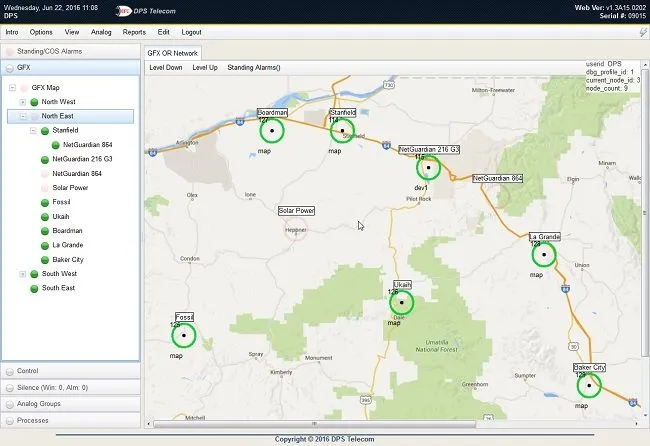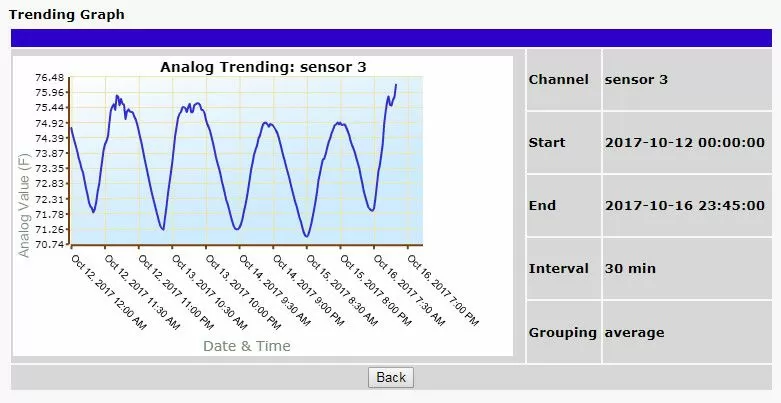Check out our White Paper Series!
A complete library of helpful advice and survival guides for every aspect of system monitoring and control.
1-800-693-0351
Have a specific question? Ask our team of expert engineers and get a specific answer!
Sign up for the next DPS Factory Training!

Whether you're new to our equipment or you've used it for years, DPS factory training is the best way to get more from your monitoring.
Reserve Your Seat TodaySupervisory Control and Data Acquisition (SCADA) systems are used in many different industries to monitor and control devices and processes in remote or inaccessible locations. While the role of SCADA may change according to the industry, some features are essential to all businesses alike.
In fact, SCADA systems can reshape many areas of companies' networks, such as:
All the key points above make it possible for you to make informed decisions that will improve the efficiency of your company's network. That's why, if you're planning to deploy a SCADA system, it's critical to become familiar with SCADA features is so important.

Imagine you are using your office computer and you need it to perform a new task, what do you do? Usually, you look for software that will allow your computer to perform the task you are trying to complete. You look for something that can expand your computer's capabilities.
Would you go and buy a brand new computer that can accomplish the job right away? Probably not, because that wouldn't be cost-effective.
The same is true for your SCADA system.
Expanding and adding new capabilities to your system is not always as easy as installing new software. If you don't plan ahead, your organization might need to replace your entire network due to the lack of adaptability and compatibility.
That's where scalability comes into play.
Modern SCADA solutions have the ability to expand in terms of capacity and scope. You can add new devices, new data sources, and even reorganize your system's structure.
Portability is one of the best features a SCADA system can give you. Portability means seamless data flow.
This gives you the ability to access your network data from wherever you are, from your phone or laptop, as long as you have an internet connection. This allows companies, government agencies, and network technicians to make informed, data-driven, and prompt decisions about how to optimize their network uptime.
In a nutshell, the portability feature makes it possible for you to optimize your response to alarms while also having better visibility over your network at all times.
Versatility is another feature that you should make sure you're getting when investing in a SCADA system. The ability to incorporate future updates smoothly and seamlessly without disturbing the workflow of your company is crucial. The same is true for integrations.
A modern SCADA system needs to be able to evolve with new technologies. Therefore, versatility should be a core feature.
You can't have versatility if you don't have modularity. Even more than that, modularity in terms of SCADA also means cost-effectivity.
A SCADA solution that has several self-serving devices is a "future-proof" system.
As I've said previously, as with any other type of technology, SCADA systems will evolve. New upgrades and features will be part of newer systems. However, most companies can't simply replace all of their older gear with the latest devices.
The best practice is to slowly replace your monitoring equipment one piece at a time, as your budget allows. So, in order to seamlessly move forward, your new SCADA devices will need to still be able to communicate with older equipment.
The new SCADA technology needs to be able to work with all the devices and configuration you currently have, even the legacy ones. Make sure your newer gear can communicate with them as seamlessly as with the devices being added to your network.
SCADA implementation is something that often gets disregarded even though this is a critical aspect to take into consideration when choosing a system.
With a SCADA that can be easily implemented, training new employees to use and configure your system will be a straightforward and simple process. If you overlook usability, your SCADA will become very limited and inefficient.
Also, note that proper scalability must provide the groundwork for simple implementations. This means that SCADA should be based on technologies that will allow not only simplicity but also scalability.
With the evolution of technology and so many competitive SCADA systems on the market, most systems are now created to be user-friendly. Note that older systems were created for functionality only, and not much attention was paid to the user side.
Having a device with an interface that is easy-to-navigate is critical for many companies now. Not only it is much easier to train new employees when the system is intuitive, but it also guarantees better visibility and faster response times since it will be easier to know exactly what is going on.

Another important advantage of a competent SCADA system is the capability of analyzing large amounts of data in a smart way. In many real-world use cases, having analysis capabilities means less network downtime due to proactive maintenance.
Thanks to advanced trend analysis of alarm conditions that allow for precision diagnostics, network technicians are able to solve issues before they evolve into bigger problems that can compromise uptime. With proactive maintenance, the chances of something going catastrophic wrong will be reduced.

So, your system allows you to access your data from anywhere, it is scalable, versatile, and user-friendly. What else do you need for a robust system?
You need to be able to reshape your system to fit your company needs. Especially if you have a unique network with unique requirements it's important that you can get a perfect-fit solution.
Make sure your SCADA provider is able to personalize their devices or build completely new solutions in order to solve all your problems. At DPS, we specialize in developing a custom system that will meet your needs 100%. In fact, our custom hardware and software development is designed to give you a single point of contact for supply and support. When it comes to network alarm management, we are your one-stop-shop.
Is your SCADA system the most reliable piece of equipment in your network? Well, it should be. After all, this is the system that will protect your network uptime, so if it fails and goes down, your investment in a monitoring solution will be unjustified.
Make sure every device in your SCADA system is durable, industrial-grade hardware. This means that they will be able to withstand the conditions at your remote sites, and will avoid leaving your mission-critical network exposed.
To be able to protect your network at all times and give you complete visibility over the status of your remote sites, it's important to have a rugged and durable SCADA system.
When looking for a SCADA system, there are many aspects that come into play. You want to make sure you are getting the most out of your investment and properly protecting your network.
Most of the time, an off-the-shelf system is not able to provide you with all the previous features we've talked about. For that, you need a competent vendor that is able to give you exactly what you need for your current and future needs.
At DPS, our engineers are SCADA experts with years of experience in providing custom-built solutions. From design to manufacturing, everything is done in-house so we can give you an efficient system in a timely manner.
Talk to us today and learn more about our remote monitoring solutions.

Morgana Siggins
Morgana Siggins is a marketing writer, content creator, and documentation specialist at DPS Telecom. She has created over 200 blog articles and videos sharing her years of experience in the remote monitoring industry.